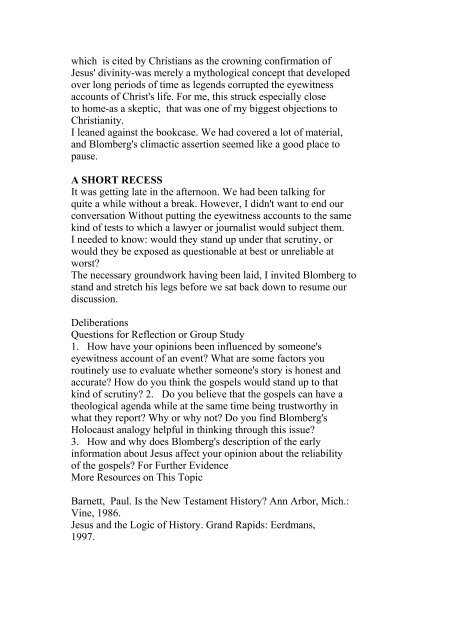The Case For Christ
The Case for Christ records Lee Strobel's attempt to "determine if there's credible evidence that Jesus of Nazareth really is the Son of God." The book consists primarily of interviews between Strobel (a former legal editor at the Chicago Tribune) and biblical scholars such as Bruce Metzger. Each interview is based on a simple question, concerning historical evidence (for example, "Can the Biographies of Jesus Be Trusted?"), scientific evidence, ("Does Archaeology Confirm or Contradict Jesus' Biographies?"), and "psychiatric evidence" ("Was Jesus Crazy When He Claimed to Be the Son of God?"). Together, these interviews compose a case brief defending Jesus' divinity, and urging readers to reach a verdict of their own.
The Case for Christ records Lee Strobel's attempt to "determine if there's credible evidence that Jesus of Nazareth really is the Son of God." The book consists primarily of interviews between Strobel (a former legal editor at the Chicago Tribune) and biblical scholars such as Bruce Metzger. Each interview is based on a simple question, concerning historical evidence (for example, "Can the Biographies of Jesus Be Trusted?"), scientific evidence, ("Does Archaeology Confirm or Contradict Jesus' Biographies?"), and "psychiatric evidence" ("Was Jesus Crazy When He Claimed to Be the Son of God?"). Together, these interviews compose a case brief defending Jesus' divinity, and urging readers to reach a verdict of their own.
Create successful ePaper yourself
Turn your PDF publications into a flip-book with our unique Google optimized e-Paper software.
which is cited by <strong>Christ</strong>ians as the crowning confirmation of<br />
Jesus' divinity-was merely a mythological concept that developed<br />
over long periods of time as legends corrupted the eyewitness<br />
accounts of <strong>Christ</strong>'s life. <strong>For</strong> me, this struck especially close<br />
to home-as a skeptic, that was one of my biggest objections to<br />
<strong>Christ</strong>ianity.<br />
I leaned against the bookcase. We had covered a lot of material,<br />
and Blomberg's climactic assertion seemed like a good place to<br />
pause.<br />
A SHORT RECESS<br />
It was getting late in the afternoon. We had been talking for<br />
quite a while without a break. However, I didn't want to end our<br />
conversation Without putting the eyewitness accounts to the same<br />
kind of tests to which a lawyer or journalist would subject them.<br />
I needed to know: would they stand up under that scrutiny, or<br />
would they be exposed as questionable at best or unreliable at<br />
worst?<br />
<strong>The</strong> necessary groundwork having been laid, I invited Blomberg to<br />
stand and stretch his legs before we sat back down to resume our<br />
discussion.<br />
Deliberations<br />
Questions for Reflection or Group Study<br />
1. How have your opinions been influenced by someone's<br />
eyewitness account of an event? What are some factors you<br />
routinely use to evaluate whether someone's story is honest and<br />
accurate? How do you think the gospels would stand up to that<br />
kind of scrutiny? 2. Do you believe that the gospels can have a<br />
theological agenda while at the same time being trustworthy in<br />
what they report? Why or why not? Do you find Blomberg's<br />
Holocaust analogy helpful in thinking through this issue?<br />
3. How and why does Blomberg's description of the early<br />
information about Jesus affect your opinion about the reliability<br />
of the gospels? <strong>For</strong> Further Evidence<br />
More Resources on This Topic<br />
Barnett, Paul. Is the New Testament History? Ann Arbor, Mich.:<br />
Vine, 1986.<br />
Jesus and the Logic of History. Grand Rapids: Eerdmans,<br />
1997.

















